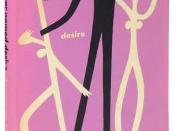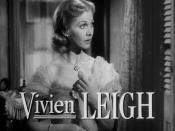Both Arthur Miller's "The Crucible" and Tennessee Williams' "Streetcar Named Desire" extract has two characters in each scene. One of them is usually one of the main characters of the stories: Mr. Proctor in the Crucible extract and Blanche DuBois from the scene of Streetcar Named Desire. Both of them had a serious conversation with their partner. There are lot of stage directions in both therefore far more indirect characterization can be found than real ones.
Mr. Proctor was depicted as a dissatisfied husband who tries to please his wife after an affair with a younger woman. He several times try to act during the extract as he cares of his wife: "halts for an instant as he hears her singing "or asking directly his wife"Are you well today? ". However, it had been several times revealed that his wife knew about his affair and she was afraid of him, also there was friction among them because of the affair.
This is expressed in mainly indirect thoughts of her in the stage directions: "she doesn't want friction, and yet she must", "quietly, fearing to anger him by prodding" or "with her courage now". All of them shows carefulness from the wife, so these suggests the strong and angry nature of Proctor. Some kind of direct examples can be found as well when the stage directions tells his reaction s towards these uncertain issues: "holding back a full condemnation of her" or " he goes directly to her and grabs her by her cloak, furious"
Blanche DuBois is also a not satisfied person , who had been just thrown away by the person she admired and felt safe next to. The description of the scene shows her weak personality that she couldn't stop drinking alcohol, when she wanted to forget what had happened to her. All of these made through the stage directions describing her actions and thoughts: "She is drinking to escape it and sense of disaster closing in on her". When Mitch her beloved men came she suddenly starts to make-up herself and care about her good-looking, all of them depicted also through stage directions: "she rushes about frantically" or "she is so excited that her breath is audible as she dashes about". She acts as like nothing happened before, but Mitch her former lover cannot forget what he had been just heard from his friend, and he acts showing Blanche his opinion on her both directly and indirectly depicted through the extract: indirect "hoarsely" or directly the short response answers to Blanche's questions.
In conclusion, both main character has depicted indirectly more often due to the long and detailed stage directions, both characters Proctor and Blanche are clearly aware with their "past crime", but they try no to think about them and act like nothing happened. This cause great friction as well as arguments with the partner.




